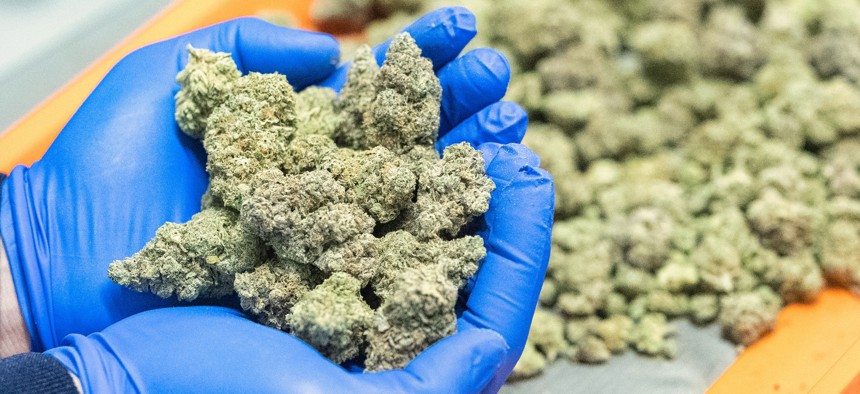Split Results in Marijuana Legalization Votes

Yuri Kriventsoff via Getty Images
Measures to legalize recreational cannabis won approval in two states, and failed in three.
Voters in Maryland and Missouri have approved ballot measures to legalize adult use of recreational marijuana, as similar measures in Arkansas, North Dakota and South Dakota failed.
The decisions come a month after President Biden announced he would pardon thousands of people who had been convicted of marijuana possession under federal law, a move that some believed would help galvanize support for legalization measures on midterm ballots.
Maryland’s constitutional amendment passed easily, with about 65% of voters in favor as of Wednesday afternoon, when 82% of votes were in. In the other four states where legalization was on the ballot, the margins of approval or rejection were slimmer.
Starting as early as July 2023, Maryland adults will be permitted to possess up to 1.5 ounces of marijuana and two cannabis plants. The amendment also triggers legislation requiring automatic reviews of low-level marijuana offenses for expungement.
In Missouri—a heavily Republican state—people over 21 will also be able to have limited amounts of cannabis and several plants under the initiative that passed. Similar to Maryland, Missouri’s measure also establishes a program to review and expunge criminal records for non-violent marijuana offenses.
With nearly 90% of votes reported early Wednesday afternoon, about 53% of Missouri voters had cast ballots in favor of marijuana legalization.
“Missourians have clearly demonstrated that support for ending prohibition isn’t relegated to the coasts or deep blue states, but that it is a common sense position that resonates with all Americans,” Erik Altieri, executive director of the cannabis advocacy group NORML, said in a statement.
With the addition of Maryland and Missouri, recreational marijuana is now legal in 21 states, two territories and Washington, D.C. Meanwhile, marijuana remains illegal at the federal level, classified as a so-called Schedule 1 narcotic, alongside drugs like heroin and LSD.
Studies have shown that the majority of Americans support legalization.
But that support largely comes from young people and Democrats, according to NORML spokesperson Morgan Fox. Four of the five states with legalization on the ballot Tuesday lean conservative, and midterm elections typically draw fewer young voters compared to general elections, he told Route Fifty.
Ahead of Tuesday’s election, medical marijuana was already legal in all five states that had legalization ballot measures.
The rejection of South Dakota’s measure is notable because, two years ago, voters approved legalizing recreational marijuana. But Gov. Kristi Noem opposed the measure and got behind a legal challenge against it that centered on technical issues with how the initiative was drafted.
Last year, the state Supreme Court overturned the amendment. On Tuesday, the latest marijuana legalization measure in the state was on track to lose by nearly 6 percentage points.
Wins can take other shapes besides successful ballot measures, Fox said. He pointed to Pennsylvania Senator-elect John Fetterman, who campaigned on legalization and hung a pro-legalization flag from his office window as lieutenant governor last year.
“For a U.S. Senate seat, that is pretty unusual and relatively unprecedented, and I think shows that this is no longer a third-rail issue,” he said. “And in fact, it's not only really supported by the general public, but it's also increasing in priority.”
Molly Bolan is the assistant editor for Route Fifty.
NEXT STORY: Kentucky Becomes Second Conservative State to Reject Anti-abortion Amendment This Year






